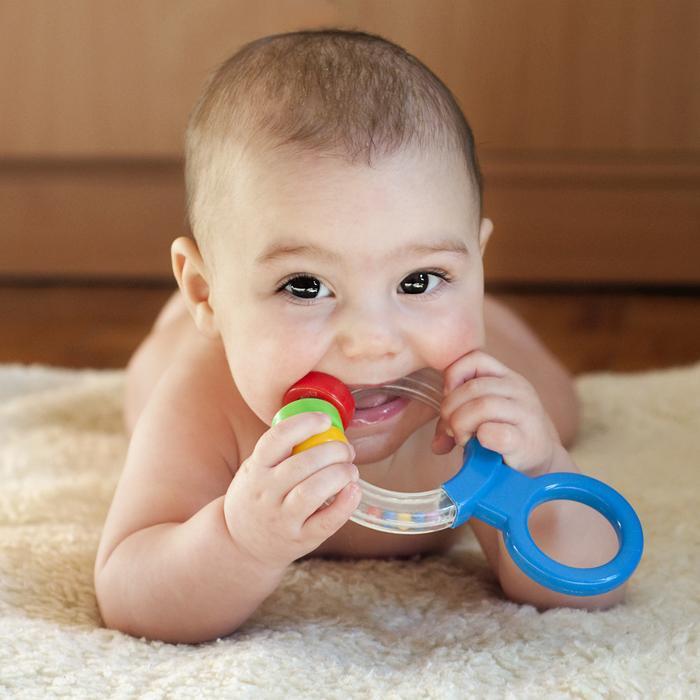Between the ages of 3 months and 9 months, your infant will begin the long process of teething. This is a time when the first baby teeth begin to emerge. The process is known as eruption and usually brings only mild periods of discomfort for the little one. These periods usually last 1-2 weeks at a time and continue for 1-2 years.
There are times, however, when the discomfort increases and the symptoms of this time period begin occurring.
These include
- excessive drooling
- excessive chewing,
- an increase in biting
- decreased appetite
- facial rash
- sleeplessness
Any parent wants to find ways to help their child through this time period. There are varying approaches, but parents often are tempted to use medication. We want to discuss if medication is the correct approach for you and why we think it should be avoided. We understand many will consider drugs for the baby.
These symptoms are not only problematic for the little one, but also for you, the parent as the following article from Consumer Affairs points out:

One thing doctors and other health care professionals agree on is that teething is a normal part of childhood that can be treated without prescription or over-the-counter (OTC) medications.
Too often well-meaning parents, grandparents and caregivers want to soothe a teething baby by rubbing numbing medications on the tot's gums, using potentially harmful drugs instead of safer, non-toxic alternatives. Medicine on the gums of teething babies a no-no
There seems to be no end to the varying opinions on soothing the sore gums of a baby. As the previous article pointed out, the topic of avoiding medications is a common theme in all the research on this topic.
The Food and Drug Administration (FDA) has warned parents that prescription drugs such as viscous lidocaine are not considered safe in their opinion for treating eruption of the pearly whites in little children or infants. In fact these medications have at times caused injury for children.
Let's examine exactly what the Food and Drug administration has stated regarding these medications for infants:

That's why the Food and Drug Administration (FDA) is warning parents that prescription drugs such as viscous lidocaine are not safe for treating teething in infants or young children, and that they have hurt some children who used those products.
FDA has previously recommended that parents and caregivers not use benzocaine products for children younger than 2 years, except under the advice and supervision of a health care professional. Benzocaine—which, like viscous lidocaine, is a local anesthetic—can be found in such OTC products as Anbesol, Hurricaine, Orajel, Baby Orajel, and Orabase.
The use of benzocaine gels and liquids for mouth and gum pain can lead to a rare but serious—and sometimes fatal—condition called methemoglobinemia, a disorder in which the amount of oxygen carried through the blood stream is greatly reduced. Do Teething Babies Need Medicine on Their Gums? No
It is clear that using these medications is not a safe practice. Our dentists hold the same opinions and have shared this with patients for years. So what are safer alternatives to help ease the discomfort?
Remember that two things can generally help the infant. First is allowing them to chew on something. The act of chewing eases the pain sensations for them. A second is to give them something soothing for their mouth. This can be accompanied by using a chew ring which has been cooled in the refrigerator.
Remember to not give the infant anything that is frozen. This can damage the delicate tissues of their mouth. Another option is to cool your finger and gently rub their gumline. This practice has shown to greatly sooth the infant, partially from the bonding and connection of parent and child. Nursing in Practice has the following suggestions:
Next best practice is to advise parents regarding self-care measures to relieve teething symptoms such as: - Gentle rubbing on the gum with a clean finger. - Allowing the baby to bite and chew on a clean and cool object.
Examples include:
> Cold wet flannel. Suggest putting a clean wet dishcloth or towel in the refrigerator and let it get cold. By letting the baby gnaw on the cloth this will help ease inflamed gums and will feel good in the baby’s mouth.
> Place a spoon in the fridge for a few hours and then let the baby have it.Teething biscuits and rusks are not recommended if they contain sugar, which causes tooth decay. Sugar-free products are preferred. Teething pain in babies | Nursing in Practice
Our pediatric dentists in Greeley remind parents that teething is normal for infants ages 2-24 months. It is a time for the parents to visually watch a part of their little one's development. So take the time to enjoy the process (even though it will at times definitely disturb your sleep as well as theirs).
Take some pictures and send them to family. Enjoy this time as it only happens once. Best of all, find good ways to just help them get through this. Always keep a few cooled rings for them to chew on.
We are here to answer your questions and help you get through this and enjoy your son or daughter's entering this time of eruption. Remember to schedule their first dental appointment before the age of one. Ideally after the first 6 teeth have erupted. Call us for an appointment.
Teething_Baby__Pavla_Zakova_-_Fotolia-com_large.jpg photo via consumeraffairs.com
ucm385884.jpg photo via fda.gov
mi-34123. photo via nursinginpractice.com
See More Here: Greeley Dentist – Should Medication be Used for Teething
No comments:
Post a Comment